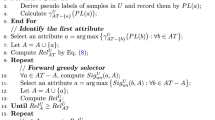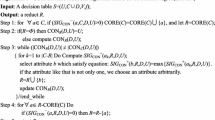Abstract
Attribute reduction is a combinatorial optimization problem in data mining that aims to find minimal reducts from large set of attributes. The problem is exacerbated if the number of instances is large. Therefore, this paper concentrates on a double treatment iterative improvement algorithm with intelligent selection on composite neighbourhood structure to solve the attribute reduction problems and to obtain near optimal reducts. The algorithm works iteratively with only accepting an improved solution. The proposed approach has been tested on a set of 13 benchmark datasets taken from the University of California, Irvine (UCI) machine learning repository in line with the state-of-the-art methods. The 13 datasets have been chosen due to the differences in size and complexity in order to test the stability of the proposed algorithm. The experimental results show that the proposed approach is able to produce competitive results for the tested datasets.
Access this chapter
Tax calculation will be finalised at checkout
Purchases are for personal use only
Preview
Unable to display preview. Download preview PDF.
Similar content being viewed by others
References
Jensen, R., Shen, Q.: Semantics-preserving dimensionality reduction: rough and fuzzy-rough-based approaches. IEEE Transactions on Knowledge and Data Engineering 16, 1457–1471 (2004)
Jensen, R., Shen, Q.: Finding rough set reducts with ant colony optimization. In: Proc. UK Workshop on Computational Intelligence, pp. 15–22 (2003)
Ke, L., Feng, Z., Ren, Z.: An efficient ant colony optimization approach to attribute reduction in rough set theory. Pattern Recognition Letters 29, 1351–1357 (2008)
Hedar, A.R., Wang, J., Fukushima, M.: Tabu search for attribute reduction in rough set theory, Soft Computing-A Fusion of Foundations. Methodologies and Applications 12, 909–918 (2008)
Jue, W., Hedar, A., Shouyang, W.: Scatter Search for Rough Set Attribute Reduction. In: Second International Conference on Bio-Inspired Computing: Theories and Applications, BIC-TA 2007, pp. 236–240 (2007)
Mafarja, M., Abdullah, S.: Modified great deluge for attribute reduction in roughset theory. In: Proceedings of International Conference on Fuzzy Systems and Knowledge Discovery, pp. 1464–1469 (2011)
Jaddi, N.S., Abdullah, S.: Nonlinear Great Deluge Algorithm for Rough Set Attribute Reduction. Journal of Information Science and Engineering 29, 49–62 (2013)
Arajy, Y.Z., Abdullah Hybrid, S.: variable neighbourhood search algorithm for attribute reduction in Rough Set Theory. In: 2010 10th International Conference on Intelligent Systems Design and Applications (ISDA), pp. 1015–1020. IEEE (2010)
Grabowski, J., Pempera, J.: Sequencing of jobs in some production system. European Journal of Operational Research 125, 535–550 (2000)
Pawlak, Z.: Rough sets. Internat. J. Comput. Inform. Sci. 11, 341–356 (1982)
Pawlak, Z.: Rough sets: Theoretical aspects of reasoning about data. Springer (1991)
Liaw, C.-F.: An efficient tabu search approach for the two-machine preemptive open shop scheduling problem. Computers & Operations Research 30, 2081–2095 (2003)
Gopalakrishnan, M., Mohan, S., He, Z.: A tabu search heuristic for preventive maintenance scheduling. Computers & Industrial Engineering 40, 149–160 (2001)
Bilge, Ü., Kiraç, F., Kurtulan, M., Pekgün, P.: A tabu search algorithm for parallel machine total tardiness problem. Computers & Operations Research 31, 397–414 (2004)
Abdullah, S., Burke, E.K., McCollum, B.: Using a Randomised Iterative Improvement Algorithm with Composite Neighbourhood Structures for the University Course Timetabling Problem. In: Metaheuristics, pp. 153–169 (2007)
Jihad, S., Abdullah, S.: Investigating composite neighbourhood structure for attribute reduction in rough set theory. In: 2010 10th International Conference on Intelligent Systems Design and Applications (ISDA), pp. 1183–1188 (2010)
Oh, I.S., Lee, J.S., Moon, B.R.: Hybrid genetic algorithms for feature selection. IEEE Transactions on Pattern Analysis and Machine Intelligence, 1424-1437 (2004)
Bandyopadhyay, S., Maulik, U., Wang, J.T.L.: Analysis of biological data: a soft computing approach. World Scientific Pub. Co. Inc. (2007)
Author information
Authors and Affiliations
Corresponding author
Editor information
Editors and Affiliations
Rights and permissions
Copyright information
© 2015 Springer International Publishing Switzerland
About this paper
Cite this paper
Kifah, S., Abdullah, S., Arajy, Y.Z. (2015). Intelligent Double Treatment Iterative Algorithm for Attribute Reduction Problems. In: Phon-Amnuaisuk, S., Au, T. (eds) Computational Intelligence in Information Systems. Advances in Intelligent Systems and Computing, vol 331. Springer, Cham. https://doi.org/10.1007/978-3-319-13153-5_10
Download citation
DOI: https://doi.org/10.1007/978-3-319-13153-5_10
Publisher Name: Springer, Cham
Print ISBN: 978-3-319-13152-8
Online ISBN: 978-3-319-13153-5
eBook Packages: EngineeringEngineering (R0)




